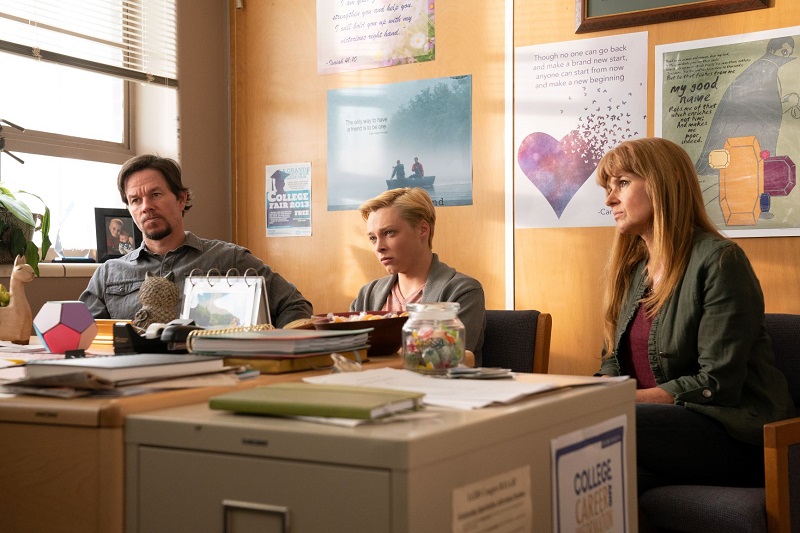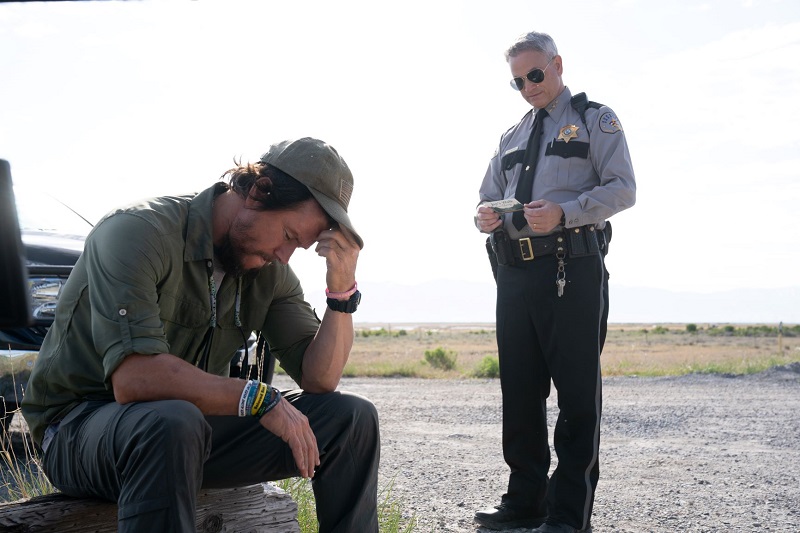Mark Wahlberg stars as the real-life titular character in Joe Bell, opening this Friday, July 23. Bell lost his gay son to suicide after bullying in his high school drove him over the edge. Wanting to do something, Bell decides to walk across America on a mission to raise awareness about bullying and acceptance across the heartland of this country in hopes that a few minds may be changed, and other lives may be saved.
Reid Miller is Jadin Bell, the teen who feels lost in his small town at the least and at the worst discriminated against so fiercely that living is too painful. His relationship with his father is complicated. Joe doesn’t have a problem with his son’s sexuality, as long as he practices his cheer routine in the backyard while he is inside “watching the game.”
When he comes out to his father and mother, the emotional and physical support is lacking in noticeably big ways. It’s not that Jadin is shunned or kicked out by his family. As Wahlberg plays Joe, he is a red-blooded American who is fine with social issues that perhaps his father was against. Yet, his connection to his son fades to nonexistent due to his skewed view that he and Jadin are polar opposites in terms of their interests and even their bond.
Miller portrays the pain and emotional hurricane in the most painfully raw, yet still innocent manner. He is realizing coming to terms with one’s sexuality at a young age, especially in a community that not only shuns anything remotely unique but actively aggressively confronts it, is the absolute worst. This aspect sends Joe into fits of rage internally.
Outwardly, Wahlberg seems to simply be plunging ahead with a life is normal sentiment that doesn’t befit his situation. He has a younger son, Joseph Bell (Maxwell Jenkins), who is into wrestling and shows incredible promise. Joe dotes over Joseph and his exploits whereas he practically ignores Jadin. There isn’t a discriminating drop of DNA going through Joe’s body. But there is something right on the surface that is simultaneously unspoken and clear as a dog’s whistle to K9’s ears.
How director Reinaldo Marcus Green has chronologically choreographed his true tale—born on the pages of the script by Diana Ossana and Larry McMurtry—is to flashback and forth between Joe’s march across America and the past where his son’s revelations reverberate through their otherwise seemingly Norman Rockwell household.
This works in its ability to bring shock and awe to a story that many probably already know. But at a certain point, the forward momentum of Joe Bell loses its mojo when this major plot point is revealed.
It’s important to the story and the forward narrative how Green and his team handled the means of storytelling, but it sadly sucks the life out of what was a living and breathing tribute to a father and son story filled with regret. Due to that fact, it does not pack the punch it should have had on everyone witnessing Jarid’s story.
Couple this with a performance from Wahlberg that crisscrosses between a dozen performances he’s turned in previously and a character that feels as if he didn’t fully digest who this Joe Bell guy is. He also struggles with how to meet his own alterations of personal opinions and feelings with an unwavering desire to make his son’s death mean something. It’s a puzzling turn by the veteran actor. His miscues in his latest feature may emerge from what he was working with—the script. There are plot decisions that are questionable, even beyond the big reveal that changes the entire direction of Joe Bell.
Wahlberg is not necessarily miscast. It is more than he is hitting notes that do not quite fit within the dramatic score of what drives Joe Bell. It must be said that the scenes of Joe and Jadin together when acceptance has taken hold are endearing, heartwarming, and feel as authentic as exist in the film. The chemistry between the lead actors works in these moments but doesn’t quite ring true in the home scenes towards the beginning of the tale.
Connie Britton is Lola Bell, Joe’s wife. She’s a fantastic actress. Her work on Friday Night Lights is the stuff of legend. Yet here she is asked to fulfill a role that is too often one we’ve seen continuously in Hollywood creations in the last several decades. The wait-at-home wife, holding down the fort whose most of her lines are delivered on a cell phone talking to her on the road husband while she raises their youngest boy. It is about as interesting as watching paint dry.
Actresses are too often asked to fill these roles and they take them because there aren’t a litany of projects centered around actresses of their age and ability. The thankless mom/wife at home who is holding the family together and stuck at home waiting for her man to do his “thing” is stale and has gotten old beyond its due date.
We recently saw this with Betty Gilpin in The Tomorrow War. Screenwriters are creative beings. There has to be a way that there can be more to these characters than what we are getting.
Grade: B-




